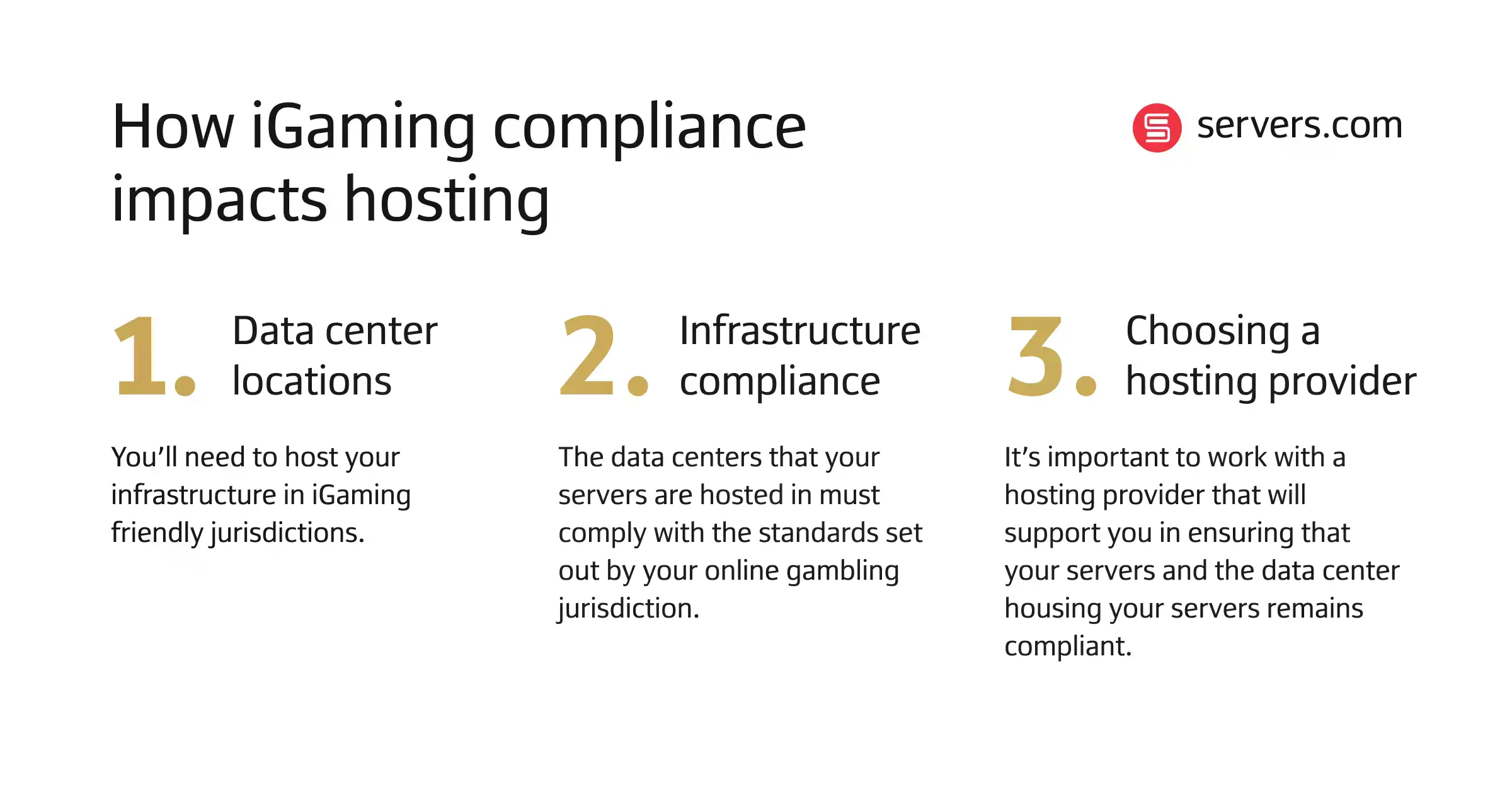

Online gambling market revenues reached in excess of $97 billion in 2024 with a projected market volume of $133 billion by the end of 2029.
These numbers are representative of how increasingly global the iGaming industry is becoming. Smartphones, growing internet access, new games and technologies are of course huge factors in this growth. But there’s another phenomenon that is having a significant impact - iGaming compliance and regulation.
While it may seem contradictory to assign credit for growth to something that is traditionally perceived as a barrier, in this instance online casino regulation is actually enabling the introduction of iGaming to jurisdictions that have traditionally blocked it.
In this blog, we look at how online gambling regulation is changing and expanding, and what that expansion means from a hosting perspective.
Worldwide, iGaming is governed through legislation at a sovereign state level meaning that national online gambling regulation differs from country to country. Any region that has specific legislation in place to license companies to operate online casinos or provide a service to those casinos is referred to as an online gambling jurisdiction.
In some cases, countries have gone so far as to ban iGaming completely, whereas others fluctuate between heavier and lighter levels of iGaming regulation. Whatever their approach, the legislation is what informs the iGaming legal compliance policies that players, operators and hosting providers must adhere to. It covers everything from the rules of the games to marketing guidelines. Importantly for hosting providers, it also covers compliance at the technology level. For example, there may be mandatory criteria for IT infrastructure testing and certification.
For example, the UK Gambling Commission’s guidance to licensing authorities stipulates three general requirements for electronic device and server-based systems:
Any server used in the gaming process must be housed securely
An audit trail for all financial transactions, errors and significant events must be maintained either on the electronic device, on the server, or by some other secure means, such that it can be accessed for compliance audit purposes
Data must be regularly backed-up and the back-up stored in a secure location
Whether you’re an online casino operator or a company that provides services to an online casino, keeping up to date with your gambling jurisdiction’s policies is vital.
Western Europe has traditionally dominated the iGaming market, with very mature online gambling jurisdictions such as Malta (and its world-renowned Malta Gaming Authority). But in recent years, new online gambling markets have started taking root. Especially in the U.S. where more states are starting to create formal frameworks of online gambling regulations.
Regulation differs between jurisdictions so it’s important that iGaming platforms remain well informed. Below we outline the regulatory landscape as it currently stands across 3 regions: the U.S, UK and Europe.
In the U.S., regulation is particularly complex since there are both federal betting laws (that apply to all states, nationwide) and state betting laws (developed at the individual state level) to consider. The legalization of online gambling is largely determined at the state level, and each state has its own gambling commission.
The country has seen a recent explosion in individual states legalizing various forms of online betting such as poker, slots and lotteries but the landscape is changing all the time so it’s worth checking out websites such as Betting USA which breaks down the different online gambling regulations for each state.
At present, only seven states have frameworks for legal and regulated online casino games. These are Connecticut, Delaware, Michigan, New Jersey, Pennsylvania, Rhode Island and West Virginia. By contrast, online sports betting is much more widespread and is already legalized in 38 states (alongside Puerto Rico and Washington).
Over the coming years, it’s expected that more states will follow and create legal frameworks for online casino games. New York, Iowa, Maryland and Maine are amongst those showing progress in this direction and Ohio is currently actively considering the legalization of slots and other online casino games for 2025.
As the U.S. shows, iGaming regulation is constantly changing. And the same is true in Europe. The region boasts several regulatory bodies including the European Gaming and Betting Association (EGBA), the European Commission (EC), the European Committee for Standardization (CEN), the Gaming Regulators Europea Forum (GREF) and European Lotteries (EL). But whilst these overarching bodies have influence in guiding regulations, each country within the EU also has its own laws and frameworks in place.
Take Germany, for example. In July 2022, Germany introduced a new federal gambling regulator, the Glücksspielbehörde (GGL). The GGL also takes a state-by-state approach, with regulation decided locally within the parameters outlined by the Glücksspielbehörde. In January 2023, the GGL approved close to 50 additional licenses for online slot games and poker. And after a period of tightening enforcement throughout 2024, the GGL firmly positioned itself as Germany’s most central regulatory body for all gambling-related activities.
In France, all signs point to a repeal on the country’s longstanding ban on online casinos and draft amendments to the government’s 2025 Finance Bill suggest that a licensed online casino market could be active within the year. Likewise, Estonia, Bulgaria and Hungary are fast emerging as promising iGaming markets. Whilst Belgium, Denmark, and the Netherlands (where iGaming was legalized in 2021), remain stable, regulated markets.
Despite being one of the most established online gambling jurisdictions, until 2023 the UK hadn’t updated its legal framework for gambling since 2005. The 2005 Gambling Act established various gaming licenses and restrictions for gambling institutions and established the UK Gambling Commission as the regulatory body responsible for ensuring the Act’s tenets were upheld.
In 2020, the UK Government made a commitment to review the 2005 Gambling Act and by April 2023, the Gambling Commission issued new governmental advice as part of the Gambling Review. “The gambling industry has changed significantly since 2005 and our advice sets out changes that will ensure Britain is the safest and fairest place to gamble in the world,” commented Andrew Rhodes, Chief Executive Officer of the Gambling Commission.
Since 2023, the Gambling Commission has been implementing various measures such as tightening identity verification procedures, limitations on advertising, enhanced licensing requirements and cooperation with international regulators. All of which go to show that the UK is moving towards an even more tightly regulated market.
It’s a question without one real answer because the online gambling regulations set out by the different online gambling jurisdictions vary so much. That said, there are some general rules that apply when hosting an iGaming platform.

Firstly, you need to look for a hosting provider that has data center locations in iGaming friendly jurisdictions. The most popular of the online gambling jurisdictions remains Malta because of its access to Europe’s trade treaties and taxation system. Like the UK, Malta has relatively strict laws for online gambling, and getting a license isn’t always easy. But its longevity and global reputation means that Malta remains a popular destination for iGaming companies.
While the Malta Gaming Authority doesn’t require iGaming companies to have their servers situated in-country, many other online gambling jurisdictions such as the U.S., Brazil, and Guernsey, do. And location is also important from a latency perspective. The closer the iGaming infrastructure is to the players, the lower the latency and the better the playing experience.
Secondly, ensure that your hosting provider has data centers that comply with the standards set out in your online gambling jurisdiction. For example, the Malta Gaming Authority sets out the following four “specific regulatory objectives” for physical technical infrastructure:
Integrity and security
Availability, traceability, and accessibility for regulatory compliance purposes
Privacy and confidentiality
Accountability
Licensees are also required to provide details of their technical infrastructure including network schematics showing all hardware and virtual machines in operation, maintain strict information security standards, conduct risk assessments, and provide the MGA with access to real time information for data supervision purposes.
Criteria will vary, so for anyone hosting an iGaming platform, maintaining the standards of your specific jurisdiction is integral.
When hosting an iGaming platform it’s important to work with a hosting provider that will support you in ensuring that (a) your servers and (b) the data center housing your servers remains compliant.
And for this, it’s usually best to partner with a hosting provider that specializes in providing infrastructure for the iGaming industry. This ensures that your infrastructure provider can work with you to create a bespoke infrastructure stack designed around the unique needs of an iGaming platform – everything from minimizing latency and downtime to ensuring best security standards.
While online casino regulation may be complicated, getting it right is imperative. Anyone looking to operate or service an online casino must ensure that their infrastructure and operations comply with the relevant gambling jurisdiction’s legal framework.
And when it comes to hosting, that includes everything from data center locations to security standards to physical hardware specifications. By working with a hosting provider that specializes in the iGaming industry, you’ll be supported in achieving iGaming compliance and optimizing your infrastructure for the unique needs of an online gambling platform.

Hannah is an experienced communications professional, with a decade-long career developing memorable campaigns for some of the world's biggest technology companies. She has a keen eye for detail and flair for creativity.